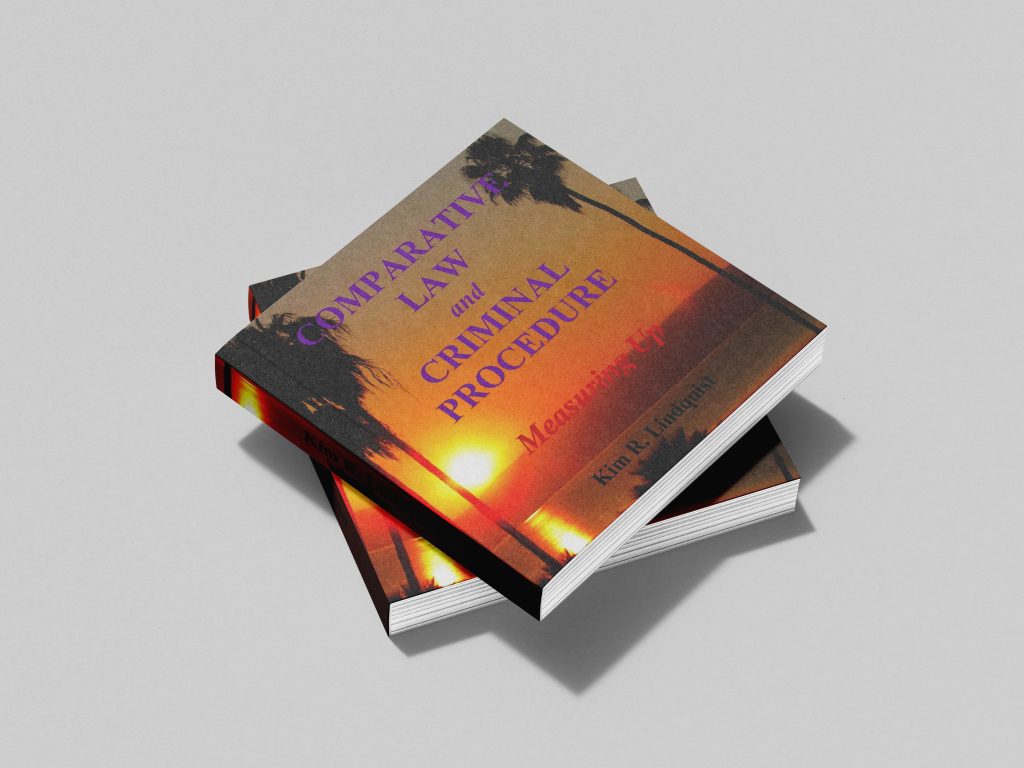COURSE 9:
THE ART OF LITIGATION
(FOR DEFENSE ATTORNEYS)
The purpose of this training is to train defense attorneys through advanced accusatory topics regarding their procedural functioning. These issues have to do with its accusatory role as a litigant and protector of the procedural rights of the accused. Through this advanced training, the defender will better understand his or her accusatory role in order to better learn how to evaluate and defend the proceedings.
Target Population:
For defense attorneys and students
(54 reviews)
(60 students)
PowerPoint Presentations
The Art of Litigation
(for Advocates)
Art, Technique and Process
The Accusatory Model and its Constituent Institutions
Bureaucracy and Criminal Proceedings
Required

Comparative Law and Criminal Procedure—Measuring Up; Kim R. Lindquist; United States; 2024
(This book, in effect, bridges the Author’s experience between the criminal justice systems of the Western Hemisphere with those of the Eastern Hemisphere. Moreover, it contains new developments in measuring the probative strength of cases and facts.)
Optional

The Elusive Rule of Law; Kim R. Lindquist; United States; 2021.
(As already noted, this book essentially constitutes the English version of the material otherwise presented in the Spanish publications as these relate to the comparative rule of law analysis.)

The Peril—from Colombia to Kabul; Kim R. Lindquist; Fulton Books, United States, 2020
(By means of the Author’s personal experiences over the years as a Federal Prosecutor and international legal consultant, this work addresses the danger of bureaucracy—the sacrifice of institution in favor of institution preservation—as the same applies to governments, private entities, and citizens otherwise. The book makes specific reference to the social phenomenon of the transition of criminal justice systems to the accusatory form as an aspect of the bureaucracy phenomenon.)
Other Required Materials
Document 1
The Art of Litigation (for Advocates)—text
Document 2
Art, Technique and Process—text
Document 3
The Accusatory Model and its Constituent Institutions—text
Document 4
Bureaucracy and Criminal Proceedings—text
Lessons
The Art of Litigation (for defense attorneys)
-
Lesson 1: The Role of the Defense Attorney
-
Lesson 2: Characteristics of the Best Defense Attorney
-
Lesson 3: Art, Technique, and Process
-
Lesson 4: Practical Manifestations of the Art of Litigation
- Lesson 5: A Square Pin in a Round Hole
Art, Technique and Process
The Accusatory Model and its Constituent Institutions
-
Lesson 1: Administrative Vehicles
-
Lesson 2: Administrative Structure
- Lesson 3: Practical Procedural Manifestation
Bureaucracy and Penal Systems
-
Lesson 1: The Meaning of "Bureaucracy"
- Lesson 2: The Impact of Bureaucracy
Comparative Law: A Summary
The investigative stage (if there is no reservation)
-
Lesson 1: Managing the Client
-
Lesson 2: The Defense's Research
-
Lesson 3: Teamwork
-
Lesson 4: The Blueprint
-
Lesson 5: Research Evaluator
- Lesson 6: Resolution by Pre-Indictment Agreements
The Binding
Lesson 1: Managing the Client
Lesson 2: The Accusation as a Document
- Legal evaluation
- Challenge
Lesson 3: The Arrest
- Assessment
- Challenge
Lesson 4: The Initial Hearing or Arraignment
- The Right to Know the Charges
- The Right to a Competent Attorney
- The right to the presumption of innocence
- The right to remain silent and not to incriminate oneself
- The right to impose the burden of proof on the prosecutor at trial
- The right to conditions of release
- The right to have the evidentiary basis confirmed by testimony
Lesson 5: The Right of Discovery
- Assessment
- Challenge
Lesson 6: The Defence Investigation
- Teamwork
- The Blueprint
Lesson 7: Resolution by Agreement
The Trial
Lesson 1: Preparing Witnesses
Lesson 2: Preparing for Physical Evidence and Authentication
Lesson 3: Controlling the Court Environment
Lesson 4: Exercising Rights Related to the Burden of Proof on the Prosecutor
- Right of accusatory paradigm by all civil servants
- Right to challenge the sufficiency of the taking of evidence by the prosecutor
- Right to challenge the evidence by cross-examination
- Right to Object to Any Extension of the Indictment
Lesson 5: Opening
Lesson 6: Cross-Examination
Lesson 7: Direct examination
Lesson 8: Objections and Rules of Evidence
Lesson 9: Closing
Tests
During and at the end of the module recipients will be required to take and successfully pass rigorous written and oral style exams.
Certification
Upon successful completion of all exams related to the module, the student will be certified with respect to the subject addressed.